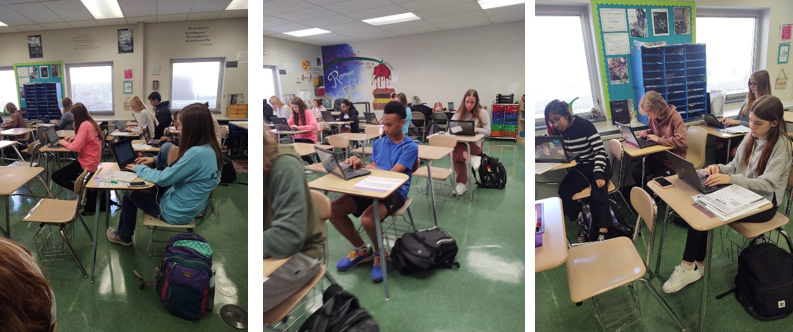This blog post was written by NCTE member Lee Ann van der Kwast.
When the weather gets cool and the birds begin to take flight, I know it’s novel-writing weather. Each November approaches, and I cannot contain my excitement for National Novel Writing Month (NaNoWriMo). I tell my creative writing students with eagerness, “You will write a novel in 30 days.” They look at me with confusion and even fear as they process this huge undertaking. Their worried faces go through a metamorphosis as the month progresses, and day by day their anxiety becomes excitement. By the end of the month, they have found their confidence as writers ready to spread their writing wings and take flight.
“I think it was fun making a whole new world up in your head and making new characters and new places,” said one of my students last year. Another said, “I loved it. I have always wanted to write a novel and now I finally got to do it.”
National Novel Writing Month (https://nanowrimo.org/) is an amazing experience for teachers and students to journey through the writing process together. Each November, I embark on this writing journey with my students. I organize my basic setting, characters, and plot. I establish my personal writing goals along with my students, and then, on November 1, we all sit at our computers with our prewriting (the NaNoWriMo site has planning guides and resources for novel writing at the middle and high school levels) and begin bringing these ideas to life day by day and chapter by chapter.
Writing a novel in 30 days sounds crazy, and it’s not easy. I share with my students my own challenges in my writing. The most challenging part is coming up with a novel idea (one that is unique and original). Some students knew immediately what they wanted to write about and what genre. I liked using a genre test (there are many online to help students discover a genre they enjoy reading that now they can write).
I also had students bring in their favorite novel mentor, their go-to for how to start a chapter, create a character, write dialogue, and so on. It was helpful to study a novel that they had read and enjoyed for insight on technique. The planning part was the next challenge, but through conferencing and working through the NaNoWriMo planning guide and writing resources, students began to connect with their characters and their story’s plot.
From my perspective as a teacher, from the conferencing stage to viewing their drafts by the end, the experience was a transformation for many student writers.
This time around (I am on my sixth NaNoWriMo challenge), writing a novel in 30 days came with many struggles and challenges. It wasn’t always a positive experience.
“Sometimes I struggled fitting things into the plot and keeping plot consistency,” reflected one student. Another shared, “I did not know what to do with the plot and felt like giving up. However, I pushed through and changed a lot of things around to make the story make sense. There were some days when I did not feel like writing at all and needed motivation and there were days when I couldn’t focus. All I did was push through and write whatever came to mind.”
I can relate to the students’ difficulties they experienced, such as with writer’s block, plot development, stamina, and momentum. However, when we face these struggles collectively as a writing community, this is how we grow as writers.
If you have not tried NaNoWriMo in your classroom, I’d encourage you to explore this challenge with your students every November. It is a great way to build community in the classroom and give students freedom of creativity. It was fun talking about their story ideas and my own story and experiences before and after class. By the end, for many writers and reluctant writers, when they see that they have reached their goals and written more than they ever thought possible, students become more confident writers.
As one student shared, “I was nervous in the beginning, but then my characters started to write the novel with me. I am proud of my novel.”
The students grew and developed as writers, and I grew and developed as a writer and as a teacher. We had to learn to turn off our inner critic, that annoying voice that constantly critiques every word, sentence, and idea. With the freedom to create new worlds and characters as the story line and characters gain a life of their own, there is a newfound need to not give up on these characters as a writer. We have a mission to finish telling their story. NaNoWriMo helps writers set realistic goals for writing and gives a sense of accomplishment and pride even for reluctant writers.
The final takeaways from last year’s students:
“I really like the story, and when I’m feeling creative I would like to come back to it later.”
“I learned that if I have a basic idea, I can change it into a great novel.”
Happy National Novel Writing Month!
 Lee Ann van der Kwast is a ninth-grade English and creative writing teacher at Methacton High School in Eagleville, Pennsylvania, located in the suburbs of Philadelphia. This is her thirteenth year teaching secondary English. She is also a club adviser for the school’s annual creative arts magazine, which showcases the talented student and faculty artists and writers. Lee Ann believes that creative writing offers students endless possibilities to explore and grow as writers: “As an educator, it is imperative for me to give students an opportunity to explore their creativity through writing.”
Lee Ann van der Kwast is a ninth-grade English and creative writing teacher at Methacton High School in Eagleville, Pennsylvania, located in the suburbs of Philadelphia. This is her thirteenth year teaching secondary English. She is also a club adviser for the school’s annual creative arts magazine, which showcases the talented student and faculty artists and writers. Lee Ann believes that creative writing offers students endless possibilities to explore and grow as writers: “As an educator, it is imperative for me to give students an opportunity to explore their creativity through writing.”
It is the policy of NCTE in all publications, including the Literacy & NCTE blog, to provide a forum for the open discussion of ideas concerning the content and the teaching of English and the language arts. Publicity accorded to any particular point of view does not imply endorsement by the Executive Committee, the Board of Directors, the staff, or the membership at large, except in announcements of policy, where such endorsement is clearly specified.

